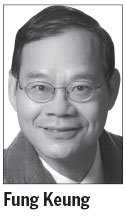|
 |
'Give me Liberty, or Give me Death!" were words in a speech made at the Virginia State legislature in 1763 by Patrick Henry, a state councilor. Henry's words swung the vote in favor of sending troops to join the Revolutionary War. I would urge some interest groups in Hong Kong to adopt this slogan - "Give us fresh air, or give us death" - and persuade our government to improve air quality in the city.
Indeed, I strongly believe that Leung Chun-ying, Hong Kong's chief executive, will win the hearts of thousands, if he undertakes to make Hong Kong's air a bit easier to breathe.
Am I an alarmist? I beg to differ. Hong Kong's air pollution, as measured by the concentrations of nitrogen dioxide in the air that we inhale, is almost three times higher than those in Sydney, New York and London. For God's sake, it is three times higher, not three percent or 30 percent!
The city's Environmental Protection Department, or?EPD, since 2006 has set a target of "no days" with the air pollution index over the "very high" level of 100. In 2007, the number of days exceeding the "very high" level totalled 74. If you think the number of days has declined since, you are only day dreaming. Sadly, in 2011 the number of days exceeding the "very high" level was 175, up 136% from 2007.
These numbers and criticisms come not from me but from the government's Audit Commission. It issued a report in mid-November, questioning the effectiveness of the commercial diesel vehicle replacement scheme introduced by the EPD in 2000. After spending HK$1.8 billion ($232.2 million), we still see 50,000 highly polluting vehicles (one-third of them are more than 17 years old) on the city's busy and congested roads.
The Audit Commission in its report also cast doubt on using government (or taxpayers') money to help equip polluting buses which are close to the end of their lives with devices to cut down nitrogen dioxides levels.
We know too well the sources of air pollution. We have too many vehicles on the roads and too many polluting trucks and buses; and we can't stop the heavily polluted air floating to Hong Kong across the Shenzhen River. Mr Leung's new government should have the fortitude to "tackle the bulls by the horns".
There are three kinds of "bulls". The first kind of "bulls" are businessmen in Hong Kong. The government should tell them to replace their commercial vehicles which are more than 10 years old to help reduce pollution. The second type of "bulls" are middle class people. Licence fees for cars over seven years old should be doubled or trebled to encourage owners to switch to new cars which cause less pollution. It would be all the better if some owners give up driving.
The third kind of "bulls" are the most fierce and hardest to tackle. These are factory owners in the Pearl River Delta. We can talk with the Guangdong provincial government to cut down the quantity of pollutants released by factories in the delta, but Hong Kong has no political muscle to get what we want. If there is no gentlemen's agreement (or having agreements that aren't workable), the Leung government is well-advised to resort to an "out of the box" approach.
The Hong Kong government could establish a fund to reward factories in the Pearl River delta that voluntarily work to reduce pollution that they produce. If the factories achieve certain targets, we would give them a cash bonus. We have billions of dollars of reserves. Few people in the city would object to such an idea.
Being a commentator, I must declare my own interest. I have suffered from having an allergy which is linked to bad air. My doctor gives me nasal sprays to stop my running nose but he warns me that the medicine is composed of steroids. Everybody knows that steroids are harmful to people's heath in the long term. To halt my nose from running (such as five minutes before a class that I teach begins), I have to swallow one or two Piriton pills, which has the side effect of making me drowsy for the whole day.
Deep in my heart I often cry in despair: "Give me fresh air or give me death!"
The author is coordinator of the B.S.Sc in financial journalism program at Hong Kong Baptist University.
